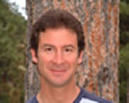 The Frank Press Public Service Award was presented to David Wald at the 2009 annual meeting in Monterey, CA. Wald serves as a research scientist at the United States Geological Survey in Golden, CO, as well as an adjunct professor at Colorado School of Mines.
The Frank Press Public Service Award was presented to David Wald at the 2009 annual meeting in Monterey, CA. Wald serves as a research scientist at the United States Geological Survey in Golden, CO, as well as an adjunct professor at Colorado School of Mines.
Throughout his career, Wald has expanded the reach and application of seismic data through development of widely-used programs such as ShakeMap and “Did You Feel It?” In addition to furthering seismic research, Wald’s work has ensured the efficient spread of earthquake information to first responders and government officials and aided countless others touched by earthquake disasters.
Wald’s advancements have made it possible for organizations and governments to disperse resources in an effective manner and make critical decisions in the minutes following an earthquake. Until a decade ago, rapid information about damaging earthquakes was limited to magnitude and location data, neither of which was much help to the public or emergency responders. The 1994 Northridge earthquake and the 1989 National Seismic System Science Plan prompted Wald and others to create ShakeMap, a program that provides near-real-time maps of ground motion and shaking intensity following significant earthquakes
The tool has become invaluable to humanitarian responders and organizations such as the Los Angeles Unified School District, FEMA and PG&E, all of whom rely on ShakeMap data. To date, more than 70,000 individuals receive ShakeMap alerts in California, Washington, Utah, Hawaii, Nevada and Alaska.
Following the success of ShakeMap, Wald next turned his attention to rectifying the poor quality and slow production of maps of shaking intensity, which had previously been constructed from mailings to postmasters. Drawing on the power and interactivity of the Internet, Wald created, “Did You Feel It?” to help researchers gain a better understanding of what occurred during an earthquake. Members of the public log on to provide detailed observations of an earthquake experience, which is translated into maps that continuously update as information is received. Wald’s advances also have allowed researchers to reassess historical earthquakes using intensity data.
“Did You Feel It?” allows members of the public to contribute to science by turning anxiety and unease into usable scientific data. The system has been a hit not only in California but also in other less earthquake-prone areas. In 2003, an earthquake of magnitude 4.6 in Alabama brought 17,000 submissions alone. More than 1 million people across the globe have contributed observations thanks to Wald’s work.
Wald’s dedication to improving the information available to responders and the public has paid dividends in major disasters around the world. Along with Paul Earle, Wald launched the Prompt Assessment of Global Earthquakes for Response (PAGER) system, which estimates the number of people subjected to levels of ground shaking within 30 minutes of an earthquake anywhere around the globe. The advancement has enabled humanitarian organizations to provide quick and appropriate responses to disasters.
PAGER includes an estimate of the impact an earthquake may have on populated areas, providing a valuable first estimate that allows organizers to know how much assistance is needed in an affected area. Previously, responders relied on reports to filter in, which could take several hours or days. PAGER was particularly useful after a magnitude 8.0 earthquake struck the coastal areas of Peru in 2007. Within minutes, PAGER estimated that hundreds of thousands of people had experienced shaking and notified the Office of U.S. Foreign Disaster about the severity of the earthquake and the response needed.
In addition to his public work, Wald has been a prolific researcher and mentor of students and postdoctoral fellows first at Caltech, and now at the Colorado School of Mines where he is an adjunct professor. His research also is widely cited by seismologists around the world. The Science Citation’s 1993-2003 compilation of most cited authors in earthquake science ranked Wald sixth in the world out of 9,000 authors from 100 countries included in the survey.
